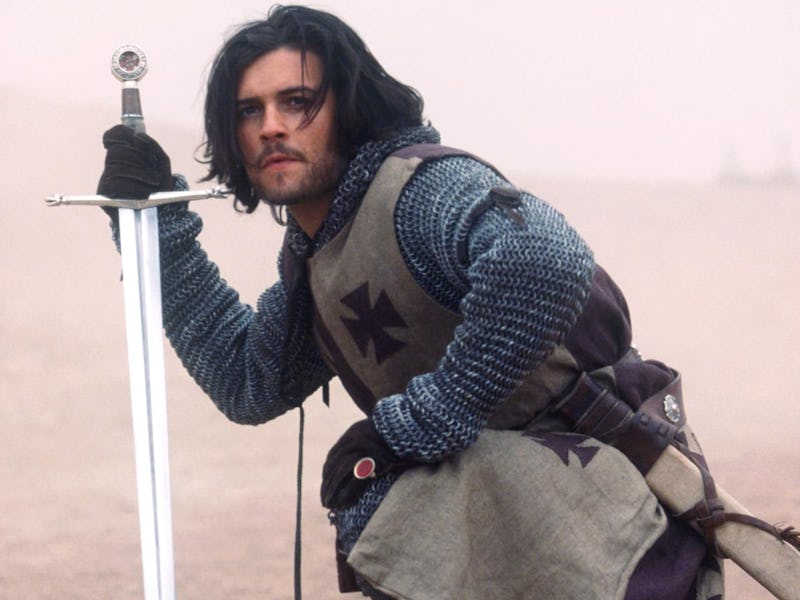Kingdom Of Heaven Is The Historical Epic We Need More Than Ever
“Give me a war.”

Ridley Scott has always been a divisive filmmaker, if not for his controversial statements, then for his checkered filmography. It’s fitting then, that one of his most misunderstood films falls somewhere in the middle — and that, 20 years later, it feels more essential than ever.
Kingdom of Heaven came in the midst of a venerable hot streak for Scott. The director was riding a high after Gladiator became an instant classic in 2000, and the three films that followed only strengthened his success at the box office. Kingdom of Heaven, meanwhile, would cut that streak short. Few knew what to make of the film when it premiered in 2005: sure, it benefited from Scott’s characteristically tactile battle scenes, a scintillating score by Harry Gregson-Williams, and an engrossing attention to detail in its costumes and sets. It had the look of an epic, but its story was totally empty of the substance a 140-minute film should have.
The film’s saving grace seemed to come from the timeliness of its subject matter. Though Scott had decided to make a film about knights years before Kingdom of Heaven entered production, it felt partially spurred on by the tragedy of 9/11 and the War on Terror, which was still going strong in 2005. In truth, though, Kingdom of Heaven will probably always be timely, if only for its treatise on inner faith.
“This film would have happened with or without the Gulf War, with or without 9/11,” Scott told Christian Answers in 2005. “It’s a passion of the period; it’s a passion of the idea of what drives a person, to pursue his doubts that he has about his faith.”
That passion drives Scott’s main hero in particular. The director tapped Orlando Bloom, who’d appeared in Black Hawk Down years prior, to star as his leading man. As Balian, a blacksmith caught in a crisis of faith, Bloom offers a subdued, grounding force to the existential themes in Kingdom of Heaven. We meet Balian as he’s grieving his late wife, who committed suicide after losing her unborn child. A disillusioned blacksmith in a nondescript province in France, he’s constantly facing scorn from the local friars, who feel the need to remind him that his wife likely went to hell for taking her own life. He’s utterly adrift until a group of crusaders returns from the front lines in Jerusalem. One of them happens to be his estranged father (Liam Neeson), who’s built a cushy life for himself in the Holy Land.
Kingdom of Heaven uses its characters to inform an epic plot, but its theatrical cut trades that for efficiency.
After 20-plus years abroad, Neeson’s Lord Godfrey comes back home in the hopes of reconnecting with his bastard son. Balian tentatively agrees to return with him to Jerusalem: there, he might intercede for his wife and start his life anew. When Godfrey dies, Balian becomes the new lord of his estate, pledging to protect those who can’t fend for themselves and keep the peace between Muslims, Jews, and Christians. This was his father’s last wish, but it also aligns with the goals of Jerusalem’s king, Baldwin IV (Edward Norton).
Despite the bloody history between the Catholic Crusaders and the Muslim Saracens, Baldwin has brokered a fragile peace with the Sultan Saladin (Ghassan Massoud). He intends to keep it for as long as he’s alive — but given his condition as a leper, his reign will soon end. And the vultures are already circling, each of whom hides their thirst for bloodshed behind religious zeal.
As Balian adjusts to life in the “kingdom of heaven,” he finds himself caught between his king’s desires for peace and the looming war between the Crusaders and the Saracens. Scott takes his time laying out the players in this vast tapestry and exploring their conflicting ideas of “good” and “evil.” This makes Kingdom of Heaven a truly emotional epic, at least in the full-length version of the film. Unfortunately, Scott faced the same issues here that he did with Gladiator and Blade Runner years prior: producers at Fox deemed Kingdom of Heaven much too long, forcing the director and his editor, Dody Dorn, to shear nearly an hour of footage.
Scott’s eye for action is on full display here, but Kingdom of Heaven’s subtle emotional depths can’t be overlooked.
Fox’s mandate produced a film that confounded most critics at the time. The theatrical version of Kingdom of Heaven skimps on crucial characterization for its sprawling cast, centering Bloom’s everyman while also stripping him of everything that made him interesting. The film’s sole female character, Sibylla (Eva Green), suffers in kind. She’s a romantic foil to Balian, but as King Baldwin’s sister and Guy’s long-suffering wife, she’s also a political pawn in the tensions miring Jerusalem. Her motivations are layered and hard to define, as it is with most of the heroes and villains here, but the theatrical cut removes a lot of that nuance to get through the plot faster.
It’s only in Scott’s much lengthier version that this politically murky, emotionally complex epic is truly allowed to shine. The quieter moments between characters are what really make Kingdom of Heaven such an essential part of the director’s filmography — and while the action still holds up to this day, it’s Scott’s message of tolerance that keeps this story timely. The idea of a bloody Holy War is nothing new: whether it’s the Crusades of medieval times, the Gulf War of the aughts, or the Gaza War in our present day, it’s something that may always persist. But by turning our eyes to the past, Kingdom of Heaven shows us the futility in this endless cycle, and all that can go wrong when we conflate personal pride with a divine right to rule.